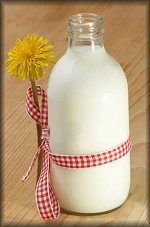 Quaker Farm Home
Quaker Farm Home
Raw Honey
Buff Orpington
Chickens
Border Leicester & Cotswold
Sheep
Collie Dogs
Quaker Pantry
Recipes & more!
Sustainable Living Workshops
About Dairy Goat
or Dairy Cow Shares
PART 1
|
About Dairy Goat or Dairy Cow Shares PART 2
The following share information relates to both dairy goat and dairy cow shares.
It does not constitute legal advice in any way.
Quaker Farm Dairy Goat Shares are not
available at this time.
 How should I handle my milk after I pick it up?
How should I handle my milk after I pick it up?
The milk supplied will be raw - that is, it is not heat-treated or pasteurized. It will be chilled;
and you should take care that it remains so until you can get it home and into your refrigerator. If
you have some distance to drive or stops to make before you arrive home, it is very important to keep
the milk at refrigerator temperature until you return home. When you come to pick up your milk, please
bring a jar or jars with your name on the lid(s) for the following week's milk. We prefer to use wide
mouth quart or ½ gallon mason jars. It is essential that both jar and lid
is scrupulously clean and thoroughly dry. We do not clean your jars.
When cleaning containers for milk, start by rinsing
away the old milk with water that is lukewarm. (Either hot or cold water can cause a deposit of milk
solids to remain on the surface of the container.) Then wash thoroughly with soap and hot water,
rinse well, and dry completely before putting on the lid. Dishwashers are fine for cleaning milk
jars. You may purchase glass jars the farm for $3.00 each
How long will raw milk keep?
Handled as described above, the milk will easily keep a week with no change at all in quality. We
have kept raw milk in the refrigerator for much longer and it was still sweet and good.
It is very good practice to date your milk as soon as it is received.
What should I do if the milk smells bad after only a couple of days?
Discard it. Please let us know right away, and we will investigate and replace it. If no one else had a
problem - or if you find that only one of your jars was bad, while the others were okay - there was
likely a problem with the sanitation of that particular jar.
What should I do with milk that is more than a week old?
As long as the milk still smells and tastes sweet and good to you, it is fine to use it. However,
you will be getting milk each week. Therefore, if you find you are consistently having extra milk,
try making some milk products, like yogurt, cheese, or soap from it. Some pets will enjoy and benefit
from any leftover milk.
Why does a layer of cream form on top of the milk?
Goat milk is naturally homogenized, meaning the fat is suspended in the milk. However, our milk is
high in butterfat and some of the cream may rise to the top of the milk. You can skim this off if you
want to use the cream. For drinking or cooking with the whole milk, just shake the container well
before pouring so that the cream is again dispersed into the milk.
Are there other ways to use raw milk?
As mentioned above, you should keep your milk refrigerated for normal beverage and cooking use.
However, if you wish to experiment with the many forms of cultured milk and farm cheeses, it is
easy to do so with raw milk. We offer cheese making and kefir making seminars and
parties at the farm. Check the Cooking Class Workshop schedule.
Can the milk be frozen?
Yes, but the butterfat from raw milk will separate out as flakes and will not blend in again when
thawed. This will lead to a strange texture. It is still healthy and fine to drink, however it may
not be as palatable to some peoples' taste. It may be used for cooking purposes, and is fine for making
cheeses and soap. We are happy to freeze milk for people who would like to pick up that way. We freeze
milk in Ziploc-style freezer bags that fit nicely in a cooler or your
freezer at the farm.
Can the milk be pasteurized on the stove top?
You can pasteurize your own milk if you wish. The milk can be heated to 145 degrees and held at
that temperature for 30 minutes. Alternatively, the milk can be heated to a higher temperature but
for a shorter length of time. However, there are many advantages to using milk raw, both nutritionally
and in terms of its versatility. Given the care that Quaker Hill Farm takes for the health of
its goats and the hygiene of its milk, we feel you can be confident in using this high quality milk
just as it comes from the goat.
Do you deliver milk?
No. You must pick up your milk on your scheduled date.
Quaker Farm Dairy Goat Shares are not
available at this time.
About Goat Milk
Goat milk compares quite favorably to cow milk with dramatically more vitamin A and the B vitamin
niacin, a higher amount of calcium, and 20% less cholesterol - all without extra calories!
The following chart illustrates some benefits of goat milk.
| Constituent |
Goat |
Cow |
Human |
| Protein
(%) |
3.0 |
3.0 |
1.1 |
| Fat
(%) |
3.8 |
3.6 |
4.0 |
| Calories
(per 100 mL) |
70 |
69 |
68 |
| Cholesterol
(mg/100 mL) |
12 |
15 |
20 |
| Vitamin
A (IU/gm fat) |
39 |
21 |
32 |
| Vitamin
B1 (Thiamin) (ug/100 gm) |
480 |
400 |
140 |
| Vitamin
B2 (Riboflavin) (ug/100 gm) |
138 |
162 |
36 |
| Vitamin
B3 (Niacin) (ug/100 gm) |
200 |
100 |
200 |
| Calcium
(mg/100 gm) |
130 |
120 |
35 |
Goat milk is a healthy alternative to cow milk and contains essential fatty acids that rice- and soy-based products lack. See the FAQ's & Links page for more discussion of the benefits of goat milk.
Facts About Goat Milk
Q: Is it true that goat milk is more “digestible” than cow milk?
A: Long considered an alternative for those with cow milk sensitivities, goat milk's ease of digestion is due in part to smaller, naturally-homogenized fats. Goat milk also tends to form smaller curds than cow milk while undergoing digestion due to its lower level of the protein casein. Smaller curds are digested more readily and more completely.
Q: Is goat milk really “naturally homogenized”?
A: Fat does not naturally mix with water - the cream portion of milk floats to the top of the water portion of milk. Cow milk is homogenized at the processing plant by forcing the milk through tiny pores under high pressure, breaking down the fat molecules into smaller chains to increase dispersion of the fat throughout the water portion of the milk. Goat milk already has a high percentage of small fat globules, making it naturally homogenized. Additionally, cow milk contains the protein agglutinin which causes fat globules to stick together. Goat milk lacks agglutinin making the fat globules less likely to stick to one another.
WHAT'S IN A GLASS OF GOAT MILK?
by Elizabeth D. Solomon via TGA Newsletter, 7/88
In this glass of goat milk you drink
is the liquid the goat made you think;
But rest assured, I'll set you straight,
come walk with me through the pasture gate.
Into this glass, muscle power,
morning and evening milking hour,
twenty percent protein feed,
all the vitamins milk goats need,
A milking stand, a feed grain can,
nylon lead macramé by hand,
hooked to a collar and a bell,
Clear fresh water brought from the well,
A sturdy barn built by our hands,
with cedar posts cut from our lands,
Eighty-two fence posts, woven wire,
a pasture fenced with unpaid hire,
Keyhole feeders to hold hay,
in the winter, fed twice a day,
Boiling water to melt the ice,
bedding straw to make sleeping nice,
Mineral and salt block they can lick,
Vet's bill and no sleep when they are sick,
At birthing time the new kids cleaned,
bottle fed three months 'til weaned,
And in the fall watching for heat,
bring does to sire, cycles repeat,
Into this glass, time and caring~~~
More that goat's milk you've been sharing
|